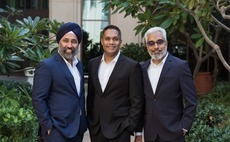
Chinese celebrities in VC: Profile booster

Chinese celebrities are entering the venture capital space, offering start-ups endorsement as well as financial support. But can a pop star’s cachet translate into long-term sustainable growth?
For Chinese start-up HeyJuice, an investment from Hong Kong actress and model Angelababy is worth far more than the dollar value of her commitment. The company now has ties to one of the cast of upcoming Hollywood blockbuster Independence Day 2, and can capitalize on the attention this brings.
Born Ying Yang, the 26-year-old actress shot to fame on the popular Chinese reality show Running Man, where contestants take part in missions at various landmarks. Angelababy has over six million followers through her Weibo microblog and has put her name to a number of coffee shops and nail salons in Hong Kong.
Last month she launched a venture capital firm - AB Capital - and made two investments: Chinese cross-border e-commerce site Ymatou and health drinks maker HeyJuice.
HeyJuice targets the young adult female demographic, supplying fruit and vegetable-based juices that assist dieting. The company plastered Angelababy's face on its website, proudly announcing that it has China's most attractive actress as a product manager. "Angelababy has tried all the drinks and helped us improve the vegetable juice. The new series of products will be available within a week," it said.
Having raised funds from Sequoia Capital, Ceyuan Ventures, VenturesLab, and the founders of Focus Media and JD.com, HeyJuice has added a celebrity endorser to its investor roster.
Angel rush
It should come as no real surprise that celebrities have hopped on to China's angel investment bandwagon. They are high net worth individuals with capital to deploy and they have seen the frenetic wealth creation in the technology space. Celebrities are making independent investments or setting up funds with others in the entertainment industry. Their endorsement could take years off a brand-building process, but is it just a flash in the pan?
"Celebrity funds' involvement can bring value to portfolio companies," says Ge Jin, investment director at China retail-focused fund Telescope Investments. "However, the impact they can have relates to the time and resources they can devote to promoting these companies."
Yang's AB Capital is not an isolated phenomenon. Her husband Xiaoming Huang is also an actor turned angel investor. Last July, he launched a super angel fund - StarVC - together with actress Bingbing Li and actor Quan Ren. The debut fund was understood to be worth RMB80 million and a successor vehicle of RMB300 million has now been fully deployed.
On the launch of Fund I, StarVC said it received over 3,000 emails from entrepreneurs asking for capital. Early investments included e-commerce site Handu and video app Miaopai. The latter went on to raise a $50 million Series C round led by KPCB, alongside Sina Corporation and Redpoint Ventures.
Celebrity funds' involvement can bring value to portfolio companies. However, the impact they can have relates to the time and resources they can devote to promoting these companies - Ge Jin
Announcing its participation in the Series C, StarVC plugged Handu: "Zara belongs to Spain; H&M is from Sweden; Uniqlo is from Japan; C&A is from Holland. StarVC asks you to shout: Handu belongs to Chinese!" The company has since seen rapid growth in its user base.
Over the past 12 months, StarVC has backed 10 companies, including peer-to-peer (P2P) lending platform Wangcai.com and luxury online retailer Hichao.com. The VC firm no longer announces its investments with great fanfare; rather, the portfolio companies post pictures of the StarVC team to promote themselves.
Celebrity cachet has also been used to source deals. When Qihoo360 Technology launched an Android-focused start-up accelerator program several months ago, it invited angel investor Xiaoping Xu, actor Chao Deng and movie director Baimei Yu to serve as mentors. Hongwei Zhou, CEO of Qihoo360, said: "Deng's involvement brings us a good supply of high quality start-up projects."
"The core value of the celebrities is to leverage their fame to generate attention. When they post online to promote the brands, hundreds of thousands of fans will follow. Start-ups can save a lot advertising fees because of that," says Desmond Marshall, managing partner of Rouge Ventures, which specializes in reinventing consumer brands in Greater China. "To maximize the celebrity effect, founders should consider how to match the target market with the right star."
Jin wants Telescope to partner with celebrity funds in order to save on marketing costs, although he admits that celebrities' value-add is still very limited.
"Based on the investments announced, celebrities haven't put sufficient resources into boosting companies' images. They are more like passive investors, creating a bit of news around the investment and that's it. We know about the investments because we're in the industry, but most consumers do not," he explains.
Sustainability issues
It is worth noting that angel investment is not a full-time job for these celebrities. By acting as a brand endorser for an investee company, they may be in violation of agreements with authorized media agencies if there is no sharing of commissions. For this reason, and because she is contracted to promoter other drink brands, Angelababy cannot pose with a bottle of HeyJuice in her hand.
Moreover, their fame is very tangible. "There're always pros and cons. If the actress is really famous and the portfolio company suddenly becomes well known, the founder should bear in mind that thousands of paparazzi will follow the star every day. You can't predict the consequences and that is the risk," Marshall says.
Ultimately, the question is whether media exposure is meaningful to the portfolio company. A celebrity might help a start-up achieve rapid growth in the first few months, but can this be sustained over several years?
"The most important area for a start-up is its core operation and developing a sustainable business model," says Joe Wu, founder of early-stage VC fund M Fund, previously CEO of 91Wireless. "Celebrities might not be able to offer this kind of help. Entrepreneurship is a long-term process; short-term success or failure is meaningless. If the start-up can only generate sales through Angelababy's endorsement, I wouldn't invest in it."
Latest News
Asian GPs slow implementation of ESG policies - survey
Asia-based private equity firms are assigning more dedicated resources to environment, social, and governance (ESG) programmes, but policy changes have slowed in the past 12 months, in part due to concerns raised internally and by LPs, according to a...
Singapore fintech start-up LXA gets $10m seed round
New Enterprise Associates (NEA) has led a USD 10m seed round for Singapore’s LXA, a financial technology start-up launched by a former Asia senior executive at The Blackstone Group.
India's InCred announces $60m round, claims unicorn status
Indian non-bank lender InCred Financial Services said it has received INR 5bn (USD 60m) at a valuation of at least USD 1bn from unnamed investors including “a global private equity fund.”
Insight leads $50m round for Australia's Roller
Insight Partners has led a USD 50m round for Australia’s Roller, a venue management software provider specializing in family fun parks.






